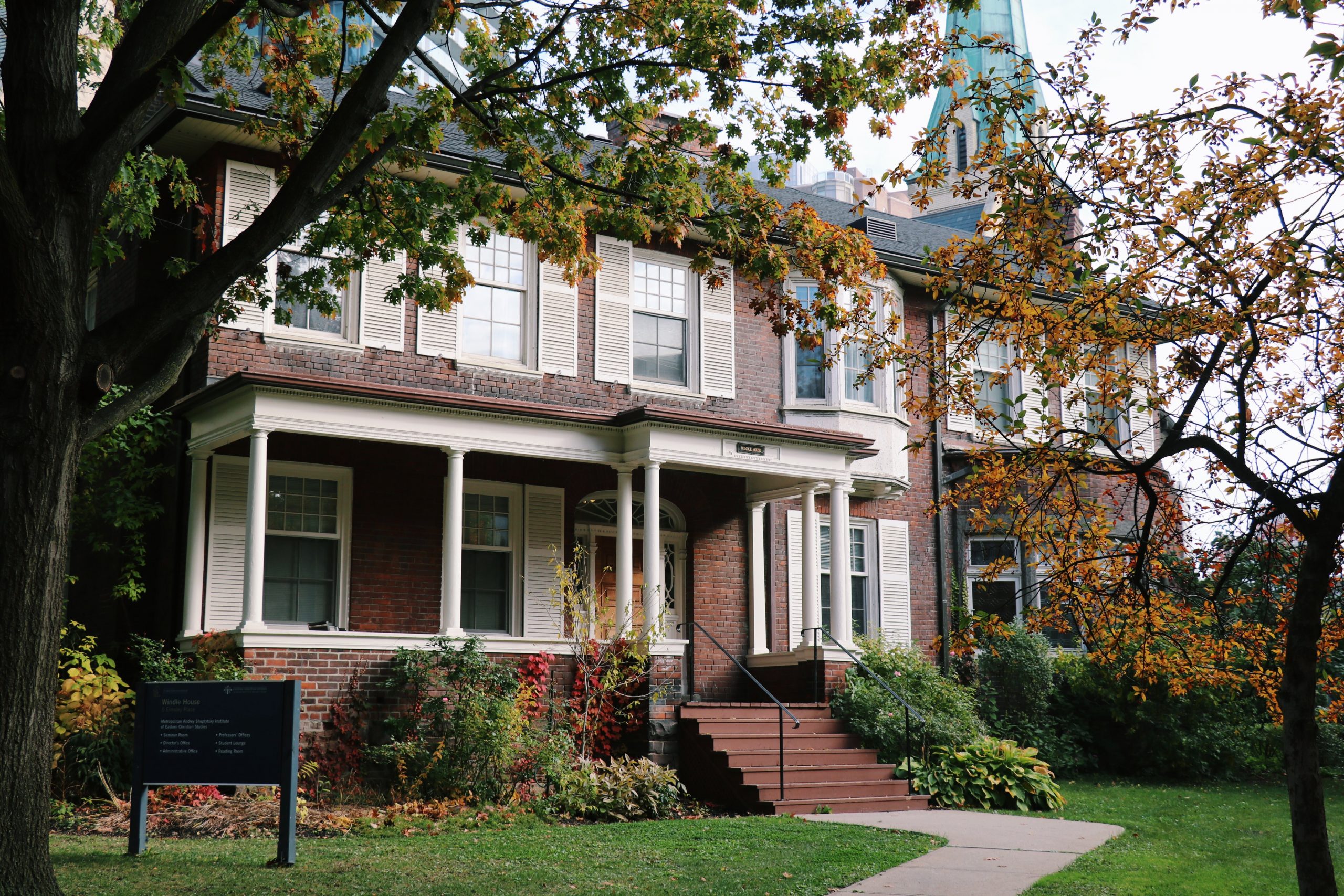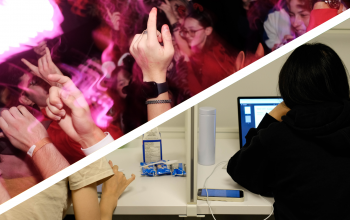Photo credit: Taylor Medeiros
A conversation with President David Sylvester
Isabel Armiento, Editor-in-Chief
From the Catholic Church’s history of unaddressed sexual violence to contemporary Catholic educational institutions perpetuating these same crimes, a growing number of students are skeptical of Catholic educational values. Incoming St. Mike’s students may be daunted by its reputation as the “Catholic college,” yet many St. Mike’s students do not identify as practising Catholics. Despite the seeming decline of Catholic education’s popularity, Catholic institutions still remain the largest educational provider globally, surpassed only by governments.
David Sylvester, President of the University of St. Michael’s College (USMC), is committed to Catholic education, affirming that it’s about “not just teaching subjects [but] teaching people — and people are more than just their intellects. They have physical, psychological, social, and spiritual needs.” He doesn’t worry about the many USMC students who practise other faiths or identify as atheist or agnostic: “Catholic education is not just for Catholics … [in fact], only 50% of students in Catholic educational institutions are Catholic. [Catholic education] is a whole philosophy of education [that puts] students at the centre of everything you do … so they can flourish as human beings.”
David Sylvester was appointed as the 8th President and Vice-Chancellor of USMC in February 2018. Before moving to USMC, he spearheaded a $15-million fundraising project at Western University’s King’s University College, designed to enhance student experience and campus morale holistically, through initiatives such as diversifying academic programming, refurbishing buildings, increasing student aid and recourses, and nurturing the university’s relationship with community partners and alumni. His goals for USMC are similarly ambitious, and revolve around promoting a campus-wide sensibility of social justice. Notably, the decisions Sylvester is making involve USMC, but not the broader University of Toronto (U of T) community: “USMC … is an independent institution from U of T. We offer our undergraduate degrees through the University of Toronto Faculty of Arts and Science … so St. Mike’s College is one part of St. Mike’s University,” Sylvester explained. “We own almost all our land [aside from] a strip along Queen’s Park which we don’t own, for example Teefy Hall, [which is] on lease by the University of Toronto.” Sylvester’s jurisdiction thus includes most of the St. Mike’s campus affairs and buildings; and while Professor Randy Boyagoda represents St. Michael’s College (SMC) within U of T, Sylvester isn’t affiliated with U of T in any capacity.
On St. Mike’s 180
USMC is currently in the middle of developing long-term plans for the campus that are broadly focused on social justice and accountability. “We’ve always had a very strong connection to give back,” Sylvester said. “We’re right in the middle of a major strategic plan right now, called St. Mike’s 180 [for which] we’ve consulted with over 20,000 members of our community, students, faculty, staff, alumni, and partners. St. Mike’s 180 suggests change, like a 180, but also [reflects] where we want to be on our 180th anniversary in 2032. What do we want to be able to say, but also what do we want others to be saying about us?” Sylvester admits, “We have a lot of work to do.”
The Mike asked what St. Mike’s 180 plan looks like, practically. “[Many] things are emerging from this,” he explains. “One is the quality of the community. Of the 90,000 people that call the University of Toronto home, we have an obligation to make this the best place where students land. Everybody who steps onto this campus should feel like they can find their way — [both] literally — we’re changing all our campus signs — and [figuratively, in] their transition to university. Every student who comes to St. Mike’s is smart enough to succeed, so [we need to] support them so that they can flourish.” He goes on to explain that St. Mike’s 180 is also about academics, and cultivating “a strong focus on … experiential learning: connecting what happens in the classroom with what happens in life.”
On Social Justice
Sylvester insisted that USMC plans to organize programming and spending around social justice, but his approach is more theoretical than practical, and more long-term than immediate. “Universities are anchors in their community, and need to start thinking about the influence they have in building up the social infrastructure, in having a social impact, [and] in how they spend their money.” Sylvester often reflects on how universities can hold themselves accountable for their impact within a city; he asks himself, “Are the [university’s] programs aligned with the needs of the community? Does the research we do support Canadians and our community?” When pressed for more specific, short-term examples of USMC’s social justice initiatives, however, Sylvester stressed that the administration is more focused on long-term projects. “We need to think very deliberately about how we have an impact, socially and economically. We’re taking a big picture, we’re trying to orient everything we do to social justice, on all fronts. We’re doing it from the bottom and top down, we’re changing our whole orientation toward that.”
On Mental Health
Sylvester’s attitude toward addressing the mental health crisis on campus was similar; passionate, certainly, but with ill-defined constructions of short-term developments. “[Mental health] is something I’m committed to very strongly, both as an educator and also as a parent,” Sylvester said. “I’ve been involved in a national undertaking … to improve mental health … in universities.” When The Mike asked whether USMC would fund additional on-site counsellors, Sylvester said, “I’ve opened negotiations with the University of Toronto to see if we can get more counsellors here. All the tuition and grants that you guys pay go to University of Toronto, none of it comes here … if we had [access to] that [money], the decision would be very easy.”
USMC’s long-term plans for mental health supports are promising. “U of T … doesn’t even have after-hours counselling, [and] that’s not acceptable,” Sylvester said. “What I’d like to do is work with Trinity and Vic and share so that … there might not be an after-hours drop-in counsellor here, but there might be one at Vic on Tuesdays and Thursdays, and we’ll do Mondays and Wednesdays, and Trin will do Fridays, or something. But right now, that’s not available anywhere on campus.”
While Sylvester’s plan to improve on-site after-hours counselling is compelling, his commitment to counselling is lax, as he doesn’t seem to grasp that for many students, counselling is a helpful, if not essential, means to healing. “A lot of this stuff is stress-related, [it] isn’t clinical issues,” Sylvester said, however, this view ignores that many students are suffering from clinical mental illnesses left untreated due to lack of adequate resources or funding. “Counselling isn’t the only answer — [we need] a broad perspective on what it means to be a healthy community,” Sylvester argues. “Getting students out of their dorms, engaged in activities, invited to different things — [we need to] stop that isolation. The quality of student’s health doesn’t just rely on counsellors.”
While USMC — and perhaps U of T more generally — fails to address the urgent need for counsellors, therapists, and other mental health workers trained to deal with clinical issues, USMC is dedicated to fostering an environment of wellness, and tackling the high-stress, competitive environment on-campus. USMC has invested $200,000 into peer mentoring initiatives, and Sylvester is hopeful that this will increase students’ mental health and wellness. “We also instituted last year something called the first-year check-in,” Sylvester adds. “Students [wanted] … more access to our professors, [and so] every faculty member has five or so students who they will go have a coffee with, or who can come visit them and [who they check in on to] find out if they need a second check-in, or third and fourth.”
On Sustainable and Accessible Infrastructure
While Sylvester remained tight-lipped on USMC budget spending on mental health resources, the university is more actively channeling its efforts into cultivating on-campus sustainable infrastructure that is both accessible and environmentally friendly. Sylvester tells The Mike that USMC will be focusing on renovating the buildings near Queen’s Park in the foreseeable future. Much of the conversation Sylvester invokes involves how to make campus space more sustainable in light of global warming and the climate crisis. “We’re not just going to fix [the buildings] up. We need to get them off steam, and we need to make them more accessible and environmentally sustainable. Every change we make needs to be done from the lens[es] … of the environment and [students’] well-being.”
The Mike asked whether there are plans for gender neutral washrooms in the works, and Sylvester responded, “This is 2020, what are we waiting for!” He admitted, however, that there are many challenges with this particular innovation. “The problem with St. Mike’s is we have a very old facility, so [there is a question of] how do we carve out a space that is barrier-free … and physically accessible … we need to retro-fit.” He gave the example of retro-fitting St. Mike’s buildings with, “small bathrooms that are gender neutral” rather than constructing larger all-gender washrooms from scratch. Sylvester cites one of the main challenges of these retrofits as balancing the need to “respect the historic aspect of the campus” while also striving to create sustainable, accessible, inclusive, and welcoming spaces.
Sylvester says he’s “hopeful to have a conversation with the students [and see if] they’re interested in dedicating some of the student improvement fund — that’s what paid for the ice rink — [to] start fixing up some of the dorms.” He promises that USMC would match the student improvement funds’ money, if it were channelled toward this endeavour. Sylvester hopes to gather enough money to renovate the dorms properly: “When they’re done, they have to be done to environmental standards. [When] changing the heating systems in the Queen’s Park system … from steam, I would love us to do geothermal heating … It would be very expensive, [but we would] reduce our carbon footprint, and … our cost over time.”
On USMC Campus Development
Another construction project USMC is planning is a site development at Kelly Library. “We think we can build a 12-storey building there — that’s academic, not condos,” Sylvester said. “We’re looking at what that building would look like for new student residences, lecture halls, a fitness centre … and additional library space meant to support our special collections. There’s a whole conversation going on around it, [and] everything in it will be focused on accessibility, broadly understood.” Sylvester understands that when it comes to making USMC buildings accessible, “we have a lot of work to do,” but he is committing to putting in the work.
While on the topic of site development, The Mike asked Sylvester how USMC feels about the Basilian fathers selling 95 St. Joseph to be redeveloped as high-rise condos by the developer Daniels. “We’re a little nervous because [the condos are] going to block the light here. We’re not ecstatic about it, and we don’t want developers in the neighbourhood,” Sylvester answered. He emphasized that he supports the Basilian fathers’ decision to sell this piece of land, however, as they need, “to make some money to sustain their [charitable] mission, and to generate some income and look after their old guys.”
Sylvester had originally hoped to collaborate with the Basilian fathers and Daniels to redevelop the building into a mutually beneficial site. “[Daniels must] maintain a certain amount of institutional land [in the redevelopment]. My thought was we should make that [institutional space at 95 St. Joseph into] residences for St. Michael’s [students],” Sylvester said. “We worked really hard to do that, but it wasn’t enough money for the developers and the Basilians. We don’t want the [developed building] to be turned into student residences that would compete with St. Mike’s, OCAD, or Ryerson … that would undermine St. Mike’s ability to do what we do. We’re very respectful of the Basilian fathers, and we’re not opposing this project — unless they put competing student housing in, which they said they wouldn’t.”
On Catholic Education
USMC is committed to fostering positive relationships with the Catholic institutions that were seminal in the institution’s founding, such as the Basilian fathers, the Loretto sisters, and the sisters of St. Joseph’s. Sylvester asserts that Catholic education principles form the framework of all initiatives he’s pushing forward at USMC, and work to encourage social justice on campus. Sylvester says that at its core, Catholic education is organized around the question of how to better our communities, and is designed to train students to approach their educational journeys with this bigger picture in mind. This, Sylvester believes, is how St. Mike’s has carved out its niche among the U of T colleges.
“We all have particular journeys,” Sylvester says, “but to live in Canada and go to the University of Toronto … is a pretty privileged place. Anyone who graduates with a St. Mike’s U of T degree should be thinking not only about how they’re grateful, but also about how they can give back … to their family, their community, to the world. With small-p privileges come obligations. That’s the role of St. Michael’s at the University of Toronto … to prepare graduates who are extremely good at what they do — good at navigating a lifetime both academically and professionally — [to be] always looking for opportunities to give and contribute to … the common good.”
Sylvester says that ultimately, “being a Catholic university is not a club, it is about seeking truth. We’re living in a post-truth world right now, and the implications of this approach — that everything is relative — is [reverberating] in politics. I think we have the obligation to seek the truth … because look at the consequences. Democracy depends on people being held accountable when they don’t [speak truthfully].”
Despite the scandals and abuse within Catholic educational systems, both within and outside USMC, the brand of Catholic education USMC offers is just as relevant now as ever: “In the age of populism, we have the responsibility as an institution to teach students to not be persuaded by rhetoric or propaganda, to seek the truth and do the right thing,” Sylvester asserts. As students navigate successful academic and professional careers, they must think about how to pursue truth, maintain accountability, and do “the right thing” within their academic, professional, and personal praxes — and that attitude starts at St. Mike’s.




